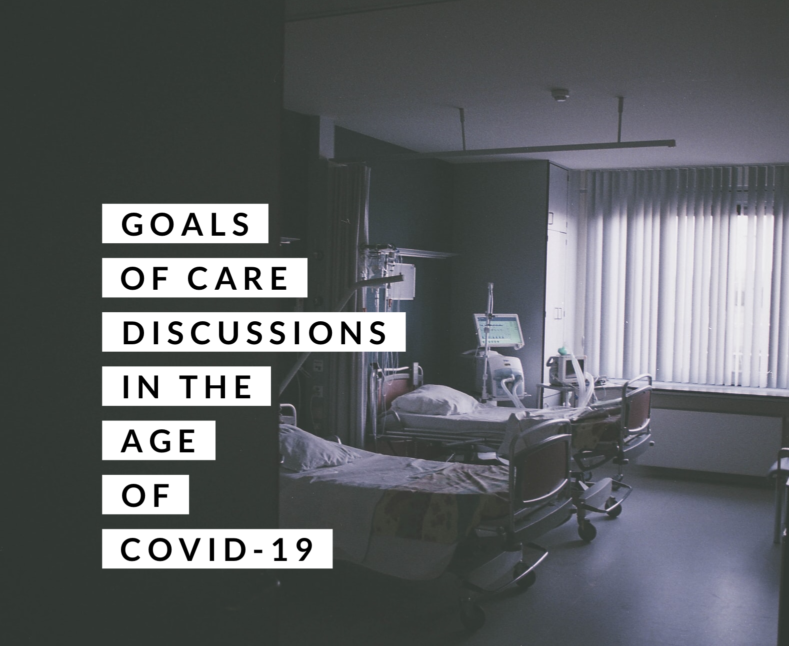“Conversations are my procedure.” – Dr. Sunita Puri, Palliative Care Physician
As a palliative care doctor, I have difficult conversations with patients and families in the face of serious illness every day. These conversations strive to balance the hopes and expectations of our patients with the medical realities of their situation. They marry the art and science of medicine.
As family doctors, you are likely familiar with goals of care discussions. These conversations involve a detailed exploration of patients’ hopes, fears, goals and wishes in the context of their illness. At the end of these discussions, we should have enough information to give medical recommendations that align with a patient’s expressed wishes and priorities.
Goals of care discussions should strive to appreciate the physician as an expert in medicine, while honouring the patient as an expert of their own life story.
For the majority of patients who are frail, elderly and living with underlying conditions, critical care interventions (i.e. CPR, intubation and ventilation) are not compatible with their priorities. In this vulnerable population, life support often leads to more suffering without extending life in a meaningful way. Most people do not want to be kept alive if there is no hope for meaningful recovery.
Goals of care discussions have always been important. In the face of the COVID-19 pandemic, they are essential.
Many of you have seen the headlines out of Italy reporting that people are “being left to die,” due to a lack of ventilators. While these headlines speak to the seriousness of the global situation, they fail to convey that for a subset of the population, the best medical advice is to avoid critical care interventions, including ventilators.
Intubation and ventilation will cause harm in certain populations. This has always been true. As physicians, we took an oath that guides us to “first do no harm.” In these specific circumstances, our ethics are not challenged. What will challenge our ethics, is if people who would not benefit or would not want critical care interventions get put on life support because we simply assume their wishes without ever asking them.
Pre-COVID 19 this happened all the time. Some studies suggest that up to two thirds of elderly patients in hospital are not asked about their preferences for care. Others site a lack of agreement between patients expressed wishes and what is documented in their medical chart, often resulting in individuals receiving intensive care that they otherwise would have never agreed to.
While we are all losing sleep over the limited ICU capacity across our country, let me be clear: this particular conversation is not about saving critical care resources for people who have more life-years left. This is about protecting our frail, elderly patients from interventions that cause suffering and harm without meaningful benefit.
As family physicians, our opportunity in these cases is to ensure good palliative care is available and offered readily to those who become ill and would not benefit from critical care interventions under any circumstance.
We will stand by our patients and their families, and not abandon them. To alleviate suffering when possible, and to lean into suffering that can’t be relieved. To offer genuine presence to those we care for during this time of fear and uncertainty.
We will not “let people die.” We will support them through this journey in a way that honours their personhood and dignity. In a way that encourages peace and does not prolong suffering. They will not be forgotten or pushed to the wayside. They will not be just another number reported on the daily news.
So, now for a call to action. Have the conversation. Identify your patients who are at risk of becoming seriously ill and dying from COVID-19, and get clear on their preferences for care. I know these discussions can be hard. Harder still to do by phone or video. But who better to have these conversations than you?
As family doctors, you’ve had the privilege of walking alongside your patients throughout the breadth of their healthcare journey. You are uniquely positioned to lead your patients through these uncertain times. Consider this task not just a duty, but an honour.
With gratitude and immense respect for the work you do,

Family Physician
& Palliative Care
For more essays on death, dying and end-of-life care, check out my blog: Talk Dying to Me.
Resources:
- The Serious Illness Conversation Guide out of Ariadne labs is a very useful tool to help navigate these discussions.
- My Voice is a provincial initiative here in British Columbia to help citizens with their advance care planning.
- Advance Care Planning Canada offers a free online advance care planning workbook.

